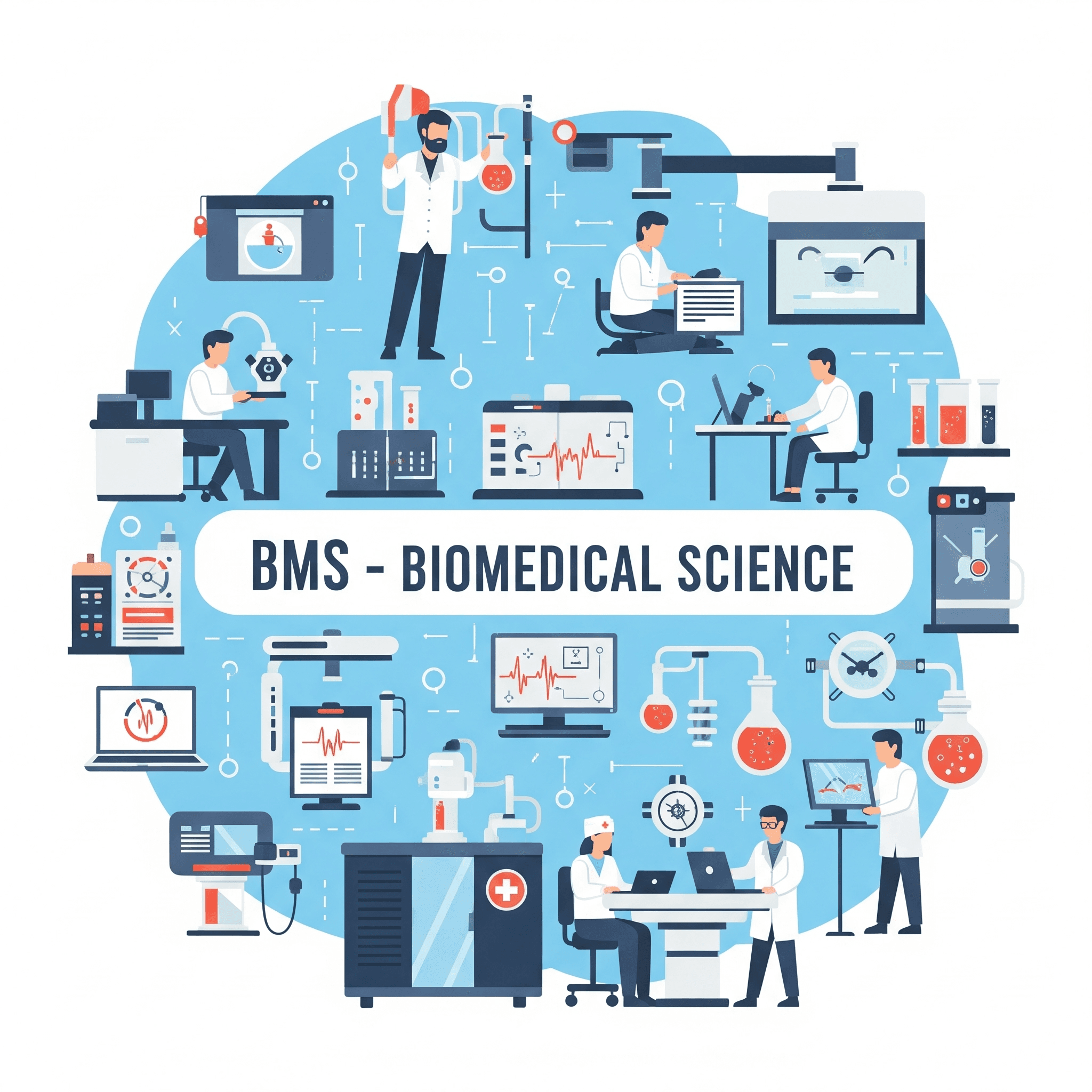Abbreviations like BMS can be confusing in the medical and health-related field as they have very different meanings in different contexts. So if you have ever searched for "BMS full form in medical" or are unsure of the meaning of BMS, this blog is for you.
If you are a student looking into a BMS degree in medical, if you are a patient going to a BMS hospital, or if you simply are interested in health-related terms, what we provide here is a complete description of BMS in the medical field. Now if you want to choose medical but are confused, this blog will help you get rid of all your doubts and in the meanwhile you can seek help from expert counsellors and also take a psychometric test to test your intelligence.
What is Full Form of BMS in Medical?
The Full Form of BMS in medical sector is:
Bachelor of Medical Science
A BMS is an undergraduate academic degree that students receive once completing a course in medical sciences, including anatomy, physiology, biochemistry, microbiology and pharmacology. An undergraduate degree is usually the first step for students as they strive for a qualified position in health care or in further studies such as medicine, dentistry, pharmacy or clinical research.
What is BMS Course in Medical?
Typically a 3-year course, a BMS medical course is designed to give students an overview of human biology, disease processes, and medical technology equipment. This program is non-clinical in nature when compared to clinical degree programs like MBBS, therefore, a BMS does not qualify a person to practice as a doctor, rather, it is a fantastic entry point and foundation for a career in health care or a research-based role in the medical sciences.
Key Features:
- Emphasis on Biomedical Sciences
- Core subjects: Pathology, Physiology, Pharmacology, Genetics
- Career-based learning, lab-based learning
- Eligible to attend varying institutions/colleges such as BMS School of Science, BMS Medical College, etc.
Is a BMS Degree in Medical Sciences Worth It?
It is absolutely worth a BMS, especially if you wish to:
- Work in the healthcare, biotechnology, diagnostics, or pharmaceutical industries
- Move on to some graduate education, (e.g. M.Sc. in Medical Sciences, M.Sc. in Public Health, MBBS (in some cases))
- Work in a medical research lab or at a biotech company, or work in academia
Who are BMS Doctors?
A common question is: "BMS doctor is what?"
As a definition, a graduate of a Bachelor of Medical Sciences program is not at present a practicing medical doctor (unlike those with MBBS or MD). However, in some jurisdictions, Bachelor of Medical Science graduates will qualify for clinical fields or medical lab and diagnostic places. In some regions (especially rural, low socio-economic conditions, or non-clinical) the phrase BMS doctor may refer to people who are not medical field practitioners, alternative medicine systems (Ayurveda or Unani) practitioners, who may have a BMS equivalent qualification.
Where is BMS taught?
There are numerous institutes throughout India and the world that provide BMS programs. Some notables include the following:
- BMS College of Allied Health Sciences
- BMS Medical College
- BMS School of Life Sciences
- BMS Hospital Basavanagudi, Bangalore (where students experience practical training and run medical services!)
Some of these organizations also provide students with access to a BMS portal, so students can access their academics, live online lectures, and research their practical training.
Eligibility for BMS Medical Course
If you wish to take the BMS degree medical course, it is fundamental to know the eligibility requirements. Typically the candidates need to fulfil the following things:
- Completion of 10+2 or any alternative exam with Science subjects (Physics, Chemistry and Biology)
- Minimum aggregate marks (usually above 50%, but could vary from institution to institution)
- Most of the universities will have their entrance examination or will look at their own merit list.
- This is the perfect course for someone who wants to study medical science but is not interested in the clinical side like an MBBS.
Best Colleges Providing BMS Medical Courses in India
Many recognized colleges and institutions have Bachelor of Medical Science programs. Some of the top names are:
- BMS College for Women, Bangalore
- BMS Institute of Technology and Management
- BMS College of Allied Health Sciences
- Manipal Academy of Higher Education
- Amity Institute of Public Health
- Jamia Hamdard University, Delhi
- St. John’s Medical College, Bangalore (or related biomedical programs)
Career prospects of BMS degree
After completing the BMS medical full form course students can access a wide range of career opportunities:
- Medical laboratory technologist
- Pharmaceutical sales reps
- Research assistant in clinical trials
- Medical writer/analyst
- Biotech and diagnostic companies
- Pursuing Higher Education (M.Sc, MP, MHA, etc.)
- Those wishing to be licensed doctors can use BMS as a pre-medical qualification and apply for entrance tests for MBBS or other related degree programs.
BMS vs MBBS - Differences
Feature BMS MBBS
- Duration 3 Years 5.5 Year (with internship)
- Focus Basic Clinical diagnosis, treatment & surgery
science & research
- Eligibility to Practice No Yes
- Career Scope Diagnostics, Research, Pharma Clinical Doctor, Surgeon
FAQ
1. Is BMS equivalent to MBBS?
No, BMS is a non-clinical degree that is based on the study of medical sciences and research. MBBS is a qualification that prepares the students for practice as doctors.
2. Can I become a doctor after BMS?
Directly, no. However, you could use your BMS experience to create a basis for applying to medical school, nursing programs or postgraduate public health degrees.
3. What jobs can I get after BMS?
You could be a lab technologist, research associate, healthcare administrator, medical writer, or pursue further education.











